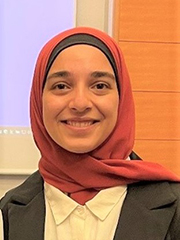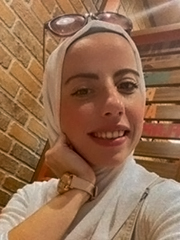Carving yourself a career: Introducing three female JISR participants
2023.04.12
Nowadays it is desirable to build a society where every individual, regardless of gender, can fulfill their potential with dignity as a human being, by strengthening the capabilities of women and girls, and promoting changes in the awareness and behavior of people.[1] In Syria, it seems to be more difficult for women to pursue professional and academic careers than in Japan, especially in STEM (Science, Technology, Engineering and Math) areas. Even in such conditions, three women, who majored in STEM in their universities, thrived to maximize their potential and joined the JISR program to study at graduate schools in Japan. We have interviewed them to hear about the way each one has seized their chance, as well as their message to female readers.
Q1) How did you come to major in STEM? What were your achievements and the difficulties you faced?
Q2) What would you like to tell the female students who are thinking about whether to major in STEM?
Q3) What would you like to tell the Syrian female students who can be potential candidates for JISR?
A1) I am studying transportation engineering at Hiroshima University. With my IT skill, I am doing research on data collection methods using mobile applications, which could contribute to the development of transportation systems.
Syria has a very traditional and closed culture, in which people think that women are better not to mingle with men. My parents had wanted me to become a teacher or a pharmacist, so I could work without associating with men, and I didn't question that. However, due to the Syrian crisis, we moved to Lebanon, where people have various cultural backgrounds. As I found a relatively liberal culture which accepts different ideas, I came to think that what I was told in Syria was not always the universal idea.
When I was awarded a prize in a science competition at my high school, I decided to pursue a career path that was different from what my parents wished. I got a scholarship at American University of Beirut and decided to major in Information Technology (IT). That was the first time that I made my own decision in my life. My parents were very against at first, but I kept persuading them by arguing my right to choose my life like my brother, who was enjoying life as he wanted in Turkey. Finally, I was able to convince them, and they changed their mind to be my supporters.

Among 19 students majoring in IT, I was the only woman. I studied programming very hard. In programming, when I wrote a code, I saw the results accordingly. It made me feel the power to control over something with technologies and I became deeply fascinated by studying it.
To tell the truth, it took about five months to talk my parents into letting me go to Japan as a JISR participant. However, they accepted my idea and now they are rather proud of me doing my best. My younger sister is following me in pursuing her own dream, currently studying business at university and my other younger sister is willing to take engineering as her major.
A2) I think there is a negative stereotype or prejudice that women don't have a scientific brain. For this reason, I believe that women are discouraged from pursuing a career in STEM. But neither man nor woman is better than the other. Listen to your heart, not what other people say. Cherish that determination and choose what you think.
A3) JISR can change the course of your life. The more options you have, the more empowered you are to live your life. You can do things that would not have been possible without joining JISR. Don't miss the chance and give it a try so that you won't regret it.
A1) Since I was a child, I have enjoyed solving math problems. I became interested in natural science because I found it interesting that we can discover something new in nature. At high school in Syria, I joined the science course, where about 30% of the students were female. After moving to Jordan due to the Syrian crisis, I joined a women's high school, where two fifths of the students majored in math and science. Because I had a gap year before joining the high school in Jordan, my younger sister and I studied together in the same class, which was good as we could help each other. We studied so hard that I graduated with distinction, and my sister was third.
My family is a typical Syrian family: my father is an engineer, and my mother is a housewife. They supported me when I decided to pursue my academic career at Philadelphia University, majoring in pharmacy. I got a scholarship that required me to work as a volunteer in NGOs. So, I worked as a STEM (Science, Technology, Engineering and Mathematics) trainer/mentor for female students as a volunteer at an NGO, where I taught programming and how to create robots. I also supported Syrian girls who moved to Jordan to continue studying at high school and going on to further education at university. Practically, I provided information and told them how to find the useful information of online language study or available scholarships, which were crucial for female students to pave their own way. I was able to feel myself as useful, as I taught and guided younger students based on my experience. I am glad that about 40% of the students I mentored have proceeded to study at university, majoring in science.

During my university studies, I noticed myself becoming more interested in the pharmaceutical business, to see pharmaceutics not only from scientific aspects, but also from business-related aspects. I became aware of a lot of problems in the pharmaceutical sector in my country that prevent opportunities to grow and develop, so I decided to study business in the JISR program in order to learn more about how I can provide solutions in this regard.
A2) It may not be easy to study math and science, but I would tell you that once you understand it, you can enjoy it because you have a bigger unknown world of natural world than you expected, where you can explore and learn something new. If you can't make up your mind which you will choose; science or social science as your major, I would say you should take science now. In my opinion, you can learn social science later, but it would be more difficult to do the other way around. I also studied pharmacy first and now I am studying business administration. If you are interested in math and science, go to the way you want, regardless of any possible social and cultural pressure you may face.
A3) Even though your current situation is not in line with your dream, it should not always prevent you from pursuing your dream. I never imagined I would be studying at a graduate school in Japan two years ago, but my life changed dramatically when I joined the JISR program.
Your present situation only represents what you are now, and you can change it to what you want to be, if you have strong will to do so.
A1) My childhood dream was to become a doctor. My parents also wanted me to be a doctor, especially because my other sisters all majored in literature. When I was seven years old, my parents bought me a computer. I remember that I played a game called "Pink Panther", that had beautiful colors and interesting details, which attracted me a lot. First, I simply enjoyed playing it but then, gradually I came to wonder how it was created and by what kind of people it was made. That was the very moment I became interested in computing. So, in my high school, although I registered many credits on medicine and pharmacy, I did not take exams for them, but I took exams and earned credits on computer science in order to major in Information Technology (IT) in university. In Lebanon, only two out of 30 female students in my high school majored in IT in university, one-fourth majored in biology, and the rest of them, which were the majority, majored in literature or English teaching. Many of the students might find it difficult to study math and computer science, probably because they require understanding and application of concepts, whereas the major requirement in biology is memorizing scientific facts.
Among the wide range of IT, programming was a very interesting area of study. I studied IT a lot to prepare for the entrance exam of the university. In fact, it was against my parents' expectation, but I wanted to follow my passion. I was glad that my parents gradually came to support me, as I started to study IT in university. During my university days, I did various kinds of activities related to IT. For example, I designed and created several webpages of private companies, including a major pizza delivery chain store in Lebanon.
I did not find any particular barrier in pursuing my career in IT in Lebanon. I worked at a company without any difficulties. I got a good inspiration there, as the required technical level for engineers was very high. A work permission by the government was needed to work in Lebanon, which was sometimes very difficult to get. But in my case, thanks to my supervisor, who had a good relationship with the company, I received an introduction and was able to work there. Apart from a slightly discriminatory atmosphere due to differences in religious factions, I did not encounter gender-based discrimination in Lebanon.
A2) Although many may worry about balancing career and marriage, I can prove that it is possible, because I am pursuing my professional career in Japan with my husband and my child. Of course, it is important to choose a partner who understands your dream and supports you well. Please follow the career path that you decide by yourself, not by others.
A3) Learning IT in Japan is a golden opportunity. I think I made the right decision in applying for JISR. You will find Japanese culture and language to be different from those of Syria and Lebanon. Learning new things makes me broaden my perspective and deepen my imagination and thought. You can learn in English at the graduate school in Japan, which is one of the attractions of JISR. I am very grateful that I was given such great opportunity to focus on my research, because it was rather difficult to simply be a researcher in Lebanon. If you are interested in JISR, I would strongly recommend that you apply for it.
Through the interviews, it turns out that everyone has their own unique background. The most impressive and common aspects are that all the participants like studying science and although initially they were not always encouraged, they are currently supported by their families. There still are many women who cannot continue studying as they want, due to discriminatory gender values in the world. Even in Japan, where active participation by women in society is touted, the percentage of women in managerial positions and science fields is still low, contributing to lower ranking on the gender gap index, with Japan ranked 116 among 146 countries in 2022.[2] We hope many women can follow these three JISR participants in pursuing their dreams regardless of social pressures.
Notes
scroll